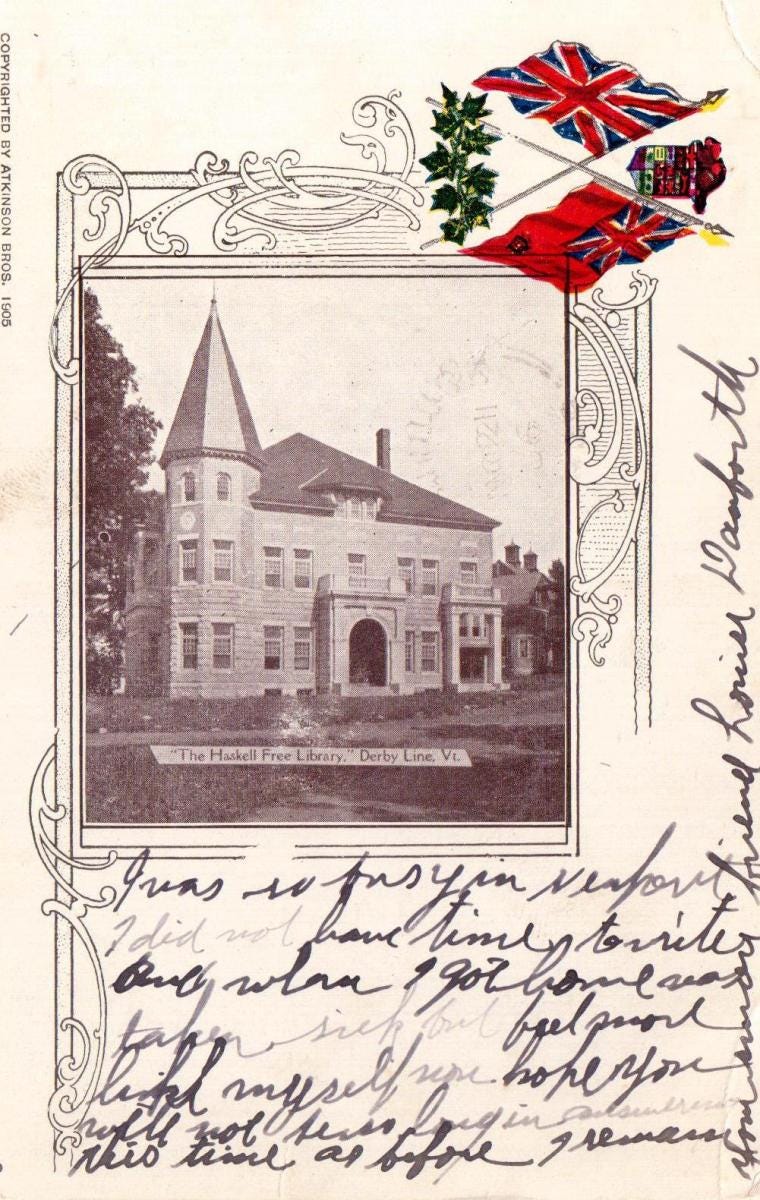For the love of libraries
A celebration of third places and the Haskell Free Library and Opera House
Hello friends,
Over the past month, I have been thinking about libraries, in general, and the Haskell Free Library and Opera House, in particular.
Libraries are vital institutions, serving not only as centres of learning but also as community hubs. Your neighbourhood sociologist would no doubt refer to the local library as a third place, which Ray Oldenburg defined as:
“the places outside of the home (the first place) and the workplace (the second place) where people go to converse with others and connect with their community”.
Jorge Luis Borges famously said: “I have always imagined that paradise will be a kind of library”.
Einstein claimed that “the only thing you absolutely have to know is the location of the library”.
I doubt Borges or Einstein ever visited the Haskell Free Library and Opera House. If they had, I am sure they would have appreciated its role not only as a third place but also as a longstanding symbol of unity and cross-border friendship.
Founded in 1901, the Haskell Free Library and Opera House sits on the border between Canada and the United States of America. It was donated for the use of residents of both countries in memory of Carlos Haskell, an American merchant, and his Canadian wife, Martha Stewart Haskell. For more than 100 years, it has enriched the lives of citizens on both sides of the border; serving as a community hub and a centre of literary, visual, and performing arts; and delivering services in both French and English.
Unfortunately, the “spirit of collaboration that has defined this institution for generations” is being undermined and the City of Stanstead, Quebec and the board of trustees for the Haskell Free Library and Opera House are calling for reinforcements. Why?
The same political forces that threaten Canada’s sovereignty are, in turn, threatened by the powerful example of international partnership and peaceful coexistence modelled by the library.
On March 5, 2025, U.S. Homeland Security Secretary Kristi Noem threw down the gauntlet when she visited the library on short notice. She stepped repeatedly across the border—marked by a line of black tape—shouting “USA Number One” and “Fifty-first state” as she moved from American to Canadian territory. Sylvie Boudreau, president of the library’s board of trustees, said Noem’s colleagues were amused but library staff and volunteers were shocked by her—dare I say: childish?— behaviour.
Soon after, the Trump administration unilaterally decided to shut down the primary Canadian access point to the facility in order to protect Americans and to stop “drug traffickers and smugglers” from exploiting the accessibility of the library. Starting in October, Canadians will be required to go through a formal border crossing before entering the library, a decision the City of Stanstead and the board of trustees says is unjustified and:
“limits off Canadian visitors from their shared history and threatens the very spirit of collaboration that has defined this institution for generations”.
Supporters have rallied in defence of the library. Best-selling novelist Louise Penny, for one, cancelled her U.S. book tour following President Donald Trump’s threats to annex Canada and donated $50,000 to the Haskell Free Library and Opera House, which has launched a fundraising campaign to pay for the new Canadian-only entrance (complete with a parking lot and mobility access) required by the United States Government. (As of April 16, 2025, they had raised $190,610, surpassing their goal of $100,000.)
Sift.
Curious about the role of third places?
Ray Oldenburg coined the term “third place” in The Great Good Place, which was first published in 1989. Watch for a sequel, Havens and Hangouts at the Heart of Community, with 80% new material, to be released by his long-time collaborator Karen Christensen in June 2025—or download the ebook now.
Other resources from Christensen include:
Shift.
Explore the art in—and about—the Haskell Free Library and Opera House.
One of the iconic pieces of art in the Haskell Free Library and Opera House is the drop curtain that adorns the stage. An example of turn-of-the-century theatre decor, it was painted by celebrated American artists Erwin LaMoss on Russian linen and installed in 1904.
But the library doesn’t just house art; it also inspires it. Kareem Fahmy wrote A Distinct Society. Listen to him talk about the play and the significance of setting it in the Haskell Free Library. (Spoiler alert: it has something to do with it being a third place.)
Lift.
Take action and support libraries.
The Haskell Free Library and Opera House is still accepting donations. Visit GoFundMe to support their renovation.
Or find a way to support your local library: get a library card; attend an event; donate to the Friends of the Library; or volunteer. Take full advantage of this vibrant third place and everything it has to offer.
Before you go
Would you do me a small favour? If you enjoy reading Sift. Shift. Lift. please take a moment to like, share, or comment below. Thank you.







Kind of a psycho clown move like so much else. I love libraries and I love peaceful international cooperation especially in the arts.
What a magical place. I hope to visit! In a strange way the episode of senseless violence you describe only confirms the significance of such wondrous places. It would be a fantastic location for a meeting!